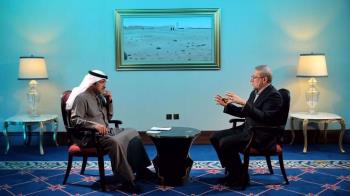Alwaght- As the Omani-mediated peace talks between Saudi Arabia and the Sana’a-based National Salvation Government (NSG) are moving slowly and the situation in the southern Yemen is strained amid popular protests, in an intriguing move, the Chairman of Yemen’s Presidential Leadership COUNCIL (PLC) Rashad al-Alimi returned to the south three months after he left Aden to the Saudi capital Riyadh.
Al-Alimi left Aden in May to join in the Arab League Summit held in Saudi Arabia, and since then he has refused to return to Aden, triggering speculations that attributed his refusal to return to the crisis in the relations between the PLC and the UAE-sponsored Southern Transitional Council (STC).
While expressing support by the STC head and deputy vice president of the PLC Aidarus al-Zoubaidi to the return of al-Alimi created optimism that Aden cabinet will have less challenges to continue its job, an attack by armed men on the presidential palace sounded the alarm to al-Alimi and his team, telling them that conditions have not changed as they may have expected.
Citing a security source, local news website Al-Masdar Online reported that the gunmen attacked the palace despite existence of ‘Thunder’ security forces affiliated with STC and it is likely that STC deputy head Abdel Rahman al-Muharami was behind arrangement of the attack. Local sources say that al-Muharami had already openly lashed out at al-Alimi and described him “unpatriotic and dependent.”
Since the establishment and announcement of the transfer of power to the PLC in April 2022, the return of all members of this council to Aden, which is under the control of the STC, has been impossible, except in one case, and the members of the PLC have left the country under pressure of the southerners.
Now the attack on the presidential palace raises a question: Will al-Alimi’s presence in Aden last or he will be forced to flee driven by differences in Aden?
Saudi Arabia’s mission for al-Alimi
Al-Alimi’s return comes as Saudi Arabia is trying to deepen its influence in the south, and for this purpose, at the same time as al-Alimi arrived in Aden, the Secretary-General of the (Persian) Gulf Cooperation Council also went to the south. There is no doubt that confrontation of the UAE plans is part of the strategy of taking on the Emirates in Yemen’s south by the PLC head.
Aware of the popular protests over the past weeks in southern provinces at poor public services, especially fuel shortage and power outage amid heat wave, al-Alimi upon his arrival stated that he has plans to immediately meet the needs of the people and even fight cabinet corruption.
He highlighted the commitment of the PLC to provide suitable conditions for the stability of the work of government institutions and leaders and to carry out structural, financial and administrative reforms in order to improve the efficiency of government services. He also thanked Saudi Arabia for what he called help to strengthen the national economy and blocking the country fall into a humanitarian crisis.
These stances beside visiting Al-Mukala in Hadhramout province and Al-Ghayda in Al-Mahra province, whose control is claimed by the STC, indicated that al-Alimi intends to take on the STC under a broader Saudi-Emirati competition in the southern provinces.
In June, the STC, which is a party to the cabinet and the PLC, announced the possibility of declaring self-governance for the southern and eastern provinces in protest of what it said was the failure to implemen the 2019 Riyadh agreement. This warning coincided with the refusal of Ahmed Lamlas, the governor of Aden city who is affiliated with the STC, to hand over Aden’s revenues to the PLC-controled Central Bank, escalating the tensions. Actually, now the so-called internationally-recognized government in Aden is actually facing the disobedience of local authorities in many areas supposedly under its control.
The dismissal of the current prime minister and the appointment of the prime minister from the south is one of the main demands of the STC. On the other hand, the PLC complains that the STC has not withdrawn its military forces from Aden, contrary to its obligations.
Amidst the ongoing disputes, even the symbolic Saudi move of sending the (P) GCC chief to Yemen to send a message of consensus among the member states in support of the PLC and the return of al-Aliimi to Aden has failed to provide a clear outlook for the ability of this cabinet to remain in Yemen and manage affairs.
What happened in the presidential palace was a sign that the conditions are not moving to getting better and it is likely that cabinet head and other officials will soon leave Aden. On the one hand corruption and inefficiency and dependence on Saudi Arabia are destroying the public confidence in the PLC and the southerners grow frustrated by the false promises of the officials day by day and on the other hand the STC obstructs administration through military pressures and via its loyal managers and governors serving in al-Alimi’s cabinet, reducing al-Alimi and his council to actors in a government mockery.



























